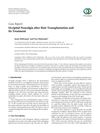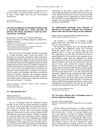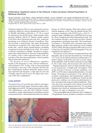 January 2025 in “Dermatologic Surgery”
January 2025 in “Dermatologic Surgery” Botulinum toxin injections can safely increase hair count in androgenetic alopecia.
 August 2023 in “Dermatologic Surgery”
August 2023 in “Dermatologic Surgery” Botulinum toxin might help with some scalp conditions, but more research is needed to confirm its effectiveness and safety.
 4 citations,
January 2021 in “Skin appendage disorders”
4 citations,
January 2021 in “Skin appendage disorders” Trichodynia is a painful scalp condition not directly linked to the amount or type of hair loss and may involve psychological factors, with treatments showing mixed results.
1 citations,
February 2024 in “Cosmetics” Cannabidiol shows promise as an effective treatment for acne.
 95 citations,
May 2012 in “British Journal of Dermatology”
95 citations,
May 2012 in “British Journal of Dermatology” Androgens block hair growth by disrupting cell signals; targeting GSK-3 may help treat hair loss.
 9 citations,
September 2015 in “Medical Clinics of North America”
9 citations,
September 2015 in “Medical Clinics of North America” The document explains how to do skin procedures, care after surgery, and when to use certain treatments.
 2 citations,
January 2015 in “Case reports in neurological medicine”
2 citations,
January 2015 in “Case reports in neurological medicine” A man's severe head pain after hair transplant was greatly relieved by pulsed radiofrequency treatment.
 December 2008 in “The American Journal of Cosmetic Surgery”
December 2008 in “The American Journal of Cosmetic Surgery” Multi-pass laser skin treatments improved healing, reduced pain, and had no major complications.
 January 2023 in “IGI Global eBooks”
January 2023 in “IGI Global eBooks” Cannabis may help with skin and hair health but could also increase heart and stroke risks.
 3 citations,
April 2022 in “Clinical, Cosmetic and Investigational Dermatology”
3 citations,
April 2022 in “Clinical, Cosmetic and Investigational Dermatology” Different methods, including stress management, healthy diet, supplements, and treatments like minoxidil, can help hair grow back after COVID-19 related hair loss.
 3 citations,
December 2022 in “Cells”
3 citations,
December 2022 in “Cells” Cannabinoids like CBD and THC may help treat non-cancer skin diseases, but more research is needed.
 43 citations,
March 2009 in “Journal of Cellular and Molecular Medicine”
43 citations,
March 2009 in “Journal of Cellular and Molecular Medicine” TGF-β2 plays a key role in human hair growth and development.
 August 2024 in “Journal of Cosmetic Dermatology”
August 2024 in “Journal of Cosmetic Dermatology” Injectable treatments can effectively and safely improve hair growth in adults with androgenetic alopecia.

The document is a detailed guide on skin conditions and treatments for dermatologists.
66 citations,
August 2007 in “Applied and environmental microbiology” The engineered yeast strain BLYAS can quickly and sensitively detect androgenic chemicals.

Botulinum toxin A helped stop hair loss and grow new hair in mice.

Botulinum toxin type A reduces itch and inflammation from histamine and may help treat certain skin conditions and hair loss.
 1 citations,
May 2008 in “Toxicon”
1 citations,
May 2008 in “Toxicon” The lowest effective dose of Botox for detrusor sphincter dyssynergia is between 75-100 units.
142 citations,
March 2019 in “Molecules/Molecules online/Molecules annual” Cannabinoids may help treat various skin conditions.

Different botulinum toxin products and concentrations can effectively reduce sweating, itching, bladder pressure, hair loss, and muscle spasms.
 42 citations,
January 2014 in “Cold Spring Harbor Perspectives in Medicine”
42 citations,
January 2014 in “Cold Spring Harbor Perspectives in Medicine” Hair growth is influenced by various body and external factors, and neighboring hairs communicate to synchronize regeneration.
24 citations,
December 2010 in “Dermatologic surgery” Botulinum toxin type A injections are not effective for severe alopecia areata.
 January 2024 in “Aesthetic Plastic Surgery”
January 2024 in “Aesthetic Plastic Surgery” Botox can help prevent hair loss by blocking cell death in scalp cells.
 May 2023 in “Research Square (Research Square)”
May 2023 in “Research Square (Research Square)” Botulinum toxin type A helps treat hair loss by stopping cell death in hair follicles through a process involving certain non-coding RNAs and a protein called Bax.
 12 citations,
January 2016 in “Skin appendage disorders”
12 citations,
January 2016 in “Skin appendage disorders” Repeated botulinum toxin injections for forehead wrinkles may cause hairline recession in some women.
10 citations,
October 2014 in “Plastic & Reconstructive Surgery Global Open” Botulinum toxin type A injections improved hair growth and scalp health in a woman with radiation-induced hair loss.
 3 citations,
January 2020 in “Acta Dermato Venereologica”
3 citations,
January 2020 in “Acta Dermato Venereologica” Netherton Syndrome can cause severe skin lesions in rare cases.






















